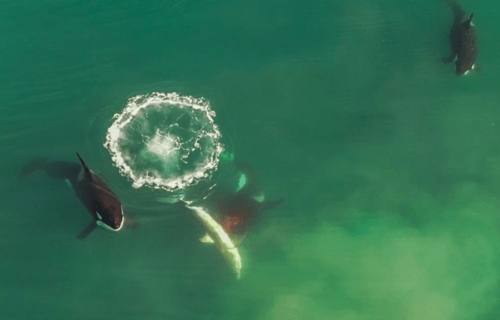GANSBAAI, South Africa — Halloween is fast approaching, and a group of killer whales are making their own horror movie in the waters near South Africa. In the first video of its kind, researchers have documented a group of orcas hunting down and killing a great white shark.
While a helicopter and drone pilot only captured one shark being slaughtered by the whales, researchers believe the huge mammals actually killed three more sharks that day. The new footage is part of an hour-long hunt from earlier in 2022 which details how sharks are fleeing the Mossel Bay region of South Africa.
It provides growing evidence that orcas are capable of pursuing, capturing, and killing great white sharks. Until now, scientists have only seen killer whales preying on other shark species.

“This behavior has never been witnessed in detail before, and certainly never from the air,” says lead author Alison Towner, a senior shark scientist at Marine Dynamics Academy in a media release.
‘Serial’ killer whales are teaching their friends to hunt sharks
Previous studies have documented two killer whales hunting down great whites near South Africa, but researchers have never seen them in action. The new video spotted one of those infamous whales, called “Starboard,” along with four other orcas. Study authors believe this unique behavior is spreading, with more whales learning to hunt down these fierce predators from more experienced orcas.
FLASHBACK: ‘Serial’ killer whale duo slaughtering great white sharks in their own hunting grounds
The new video is also revealing how sharks are trying to avoid becoming the whales’ next meal. Twice, the team watched as the orcas slowly swam up close to a shark. Instead of fleeing, the shark stayed close to the whales and kept them in view. It’s a common strategy that seals and turtles use to defend against shark attacks.
Since orcas are more social creatures and typically hunt in groups, however, the team believes this tactic is backfiring on the great white sharks.
“Killer whales are highly intelligent and social animals. Their group hunting methods make them incredibly effective predators,” explains marine mammal specialist and study co-author Dr. Simon Elwen, Director of Sea Search and a research associate at Stellenbosch University.
Just like infamous movie character Hannibal Lecter, the team says “Starboard” ate a large piece of the shark’s liver after another whale swam up and attacked their victim. Unlike the horror movie, “Starboard” likely skipped the fava beans and a nice Chianti.
“I first saw Starboard in 2015 when he and his close-associated ‘Port’ were linked to killing seven gill sharks in False Bay. We saw them kill a bronze whaler [copper shark] in 2019 – but this new observation is really something else,” says David Hurwitz, a boat-based whale-watching operator from Simon’s Town Boat Company.
Sharks are looking for safer waters
Interestingly, drone and cage dive boat data found that sharks continued to swim in the area in the weeks leading up to the attack. Researchers even saw multiple sharks in the region on the day of these incidents.
After these sharks met with a gruesome fate however, researchers only saw one great white shark for the next 45 says.
“We first observed the flight responses of seven gills and white sharks to the presence of killer whales Port and Starboard in False Bay in 2015 and 2017. The sharks ultimately abandoned former key habitats, which has had significant knock-on effects for both the ecosystem and shark-related tourism,” says South African National Parks’ shark expert and marine biologist, Dr. Alison Kock.
The team notes that previous studies have documented how killer whales learn new behaviors over time through “cultural transmission.” The new study adds that if more killer whales pick up this habit of dining on great whites, this new behavior will have a major impact on sharks and the ocean food chain.
Researchers documented the incident in the journal Ecology.
